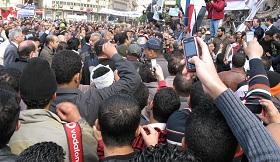Mining minerals from desalination brine in Saudi Arabia
21 December 2025
Published online 8 February 2011

To say that 2011 started with a bang would be a major understatement. We are only one month into the new year and there have been popular uprisings in two Arab states. The events in Tunisia and Egypt have sent shockwaves across the region, leading to large demonstrations in Jordan, Yemen and Algeria.
Nature Middle East talked to Nidhal Guessoum, an astrophysicist and professor of physics at the American University of Sharjah, United Arab Emirates, and author of Islam's Quantum Question about how these events will affect the scientific community in the region and what role they can play.
The transformation of the Arab states from autocratic regimes to democratic and meritocratic systems is long overdue. Many pretexts had been used by those who want to keep exclusive power by subjugating the people: the effects of colonialism (illiteracy, in particular), the lingering tribal social dynamics, the clashes between ideologies (from Marxism to Islamism), the need for stability to achieve socio-economic development, etc. But it has long been clear that those were only pretexts. Many of them are now obsolete, and they have served mostly to protect and justify the power used by the autocrats for personal gains over the decades.
Financial and moral corruption has grown like a cancer in most Arab societies. While whole swaths of the population have been living under miserable conditions, funds were being diverted away from economic development. Basic freedoms, of expression, of congregation, of press, of dissent, and sometimes just of worship, were denied.
When countries spend several decades under a state of emergency, it is clear that serious change needs to occur. Unfortunately, this is not the case in only one or two states. It is the same situation in many, if not most, Arab countries. Thus the logic of history says that change will take place in other places as well, sooner than later, especially now that new media has empowered people, who no longer need the organizational structures and directives of political parties to make their voices heard.
Academics must make sure that never again will their freedoms of thought, of inquiry, of assembly, and of dissent, be taken away
Academics, with their high levels of education and their experience in civilized discourse, should guide the protests and the transitions, first and foremost to ensure their peacefulness and orderliness. Even slogans should be filtered by the educated leaders. Anyone who has a special skill should make use of it: physicians should volunteer to treat the wounded (physically and psychologically); writers should use their talents to express the people's anger, anxiety, and hopes in meaningful and inspiring ways; computer techies should help achieve the best usage of digital communication technologies.
It certainly will. At the very least, censorship will greatly diminish now, and arbitrary and capricious decisions will, hopefully, be replaced by objective and constructive ones, so that research will not be evaluated (for funding and for promotion) on personal grounds, but rather on meritocratic grounds.
One of the reasons for the mediocre state of research in the region is the absence of fair and objective standards and measures of quality. Too often, scientists make it to prominent positions of leadership and visibility when their research was never of any substantial value, while more meritorious researchers are denied any credit and are even pushed down, simply because they did not play by the corrupt system's rules of the game. This must change now, with transparency and meritocracy being implemented in all areas of society.
Academics are the guiding light of their society. They must make sure the new direction taken by their countries is the right one. Being highly educated means they must be fully aware of the past experience and the pitfalls encountered by other countries. Indeed, Arab states are not the first ones to break free from despotic regimes. Academics will have learned from past revolutions that were a success and pave the way to success.
Secondly, closer to their bases, academics must make sure that never again will their freedoms of thought, of inquiry, of assembly, and of dissent, be taken away. A system of preservation of freedoms must be put in place to ensure that no one will be able to hijack them. Constitutions will have to be carefully drafted, checks and balances must be built into the system, and academics must set the example for the rest of society in exercising those freedoms and those rights effectively and responsibly.
Academics are the guiding light of their society. They must make sure the new direction taken by their countries is the right one
People with high experience or talent that can be used in the ongoing social and political transformation should all take part in one way or another. In other revolutions, leaders were sometimes doctors, playwrights, religious scholars, or non-academic political activists.
The extent of the scientists' involvement will be mutually decided by them — if they think they have something important to contribute — and by the people — if they find that those scientists are really benefiting the cause, not just taking advantage of their prominence.
In general, Algeria is not in a better situation compared to most of the other Arab states. There too, democracy is a décor, nepotism and corruption are widespread and meritocracy is rarely practiced. In different areas of social, political, economic, cultural, and academic life, Algeria is sometimes better and sometimes worse than other Arab countries, but it too is due for serious change, if not for a revolution.
doi:10.1038/nmiddleeast.2011.13
Stay connected: